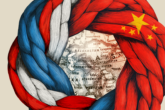November 30, 2021
The Most Powerful Data Broker in the World Is Winning the War Against the U.S.
President Biden came away from his summit with China’s President Xi Jinping on Nov. 15 committed to prosecuting what he called “simple, straightforward competition” with China. Yet Beijing is already beating the United States and its allies in one crucial domain: data.
Data is the oil of the 21st century, the indispensable resource that will fuel artificial-intelligence algorithms, economic strength and national power. The wellspring of this data is all of us: our health records and genetic sequences, our online habits, the supply chain flows of our businesses, the terabytes of imagery guzzled by phones, drones and autonomous cars.
The competition for global influence in the 21st century will require protecting and harnessing this data to achieve commercial, technological and military advantages.
So far, China is winning, and the West is barely even engaged.
Through a latticework of recent laws and regulations, Mr. Xi has been hard at work making the Chinese Communist Party the world’s most powerful data broker. How does Beijing do that? By walling Chinese data off from the world, exerting new extraterritorial power over global data flows and putting foreign companies operating in China in a legal bind — all while absorbing other countries’ data by means licit and illicit.
Mr. Xi knows that even locking down only Chinese data, representing the patterns and behavior of some 1.4 billion people, would hobble Beijing’s rivals in the quest for global economic superiority.
The Biden administration has spoken about the importance of data in our competition with China. But no visible strategy has emerged. That threatens Americans’ privacy, economic competitiveness, national security and future global standing. This will be a major test of America’s China policy in 2022.
Washington’s blind spot to the centrality of big data in Beijing’s ambitions and to the ways our own data are being exploited in service of those ambitions is perplexing at a time when American politicians are growing more concerned about the collection and potential exploitation of big data by U.S. tech giants.
Read the full article from The New York Times.
More from CNAS
-
Trump 2.0 and Security in Asia
Donald Trump is bringing his "America First" agenda back to U.S. foreign policy. What could this mean for Japan and the partners in Asia? Akira Igata, an Adjunct Senior Fellow...
By Akira Igata
-
Syria: What Happened and What Comes Next
After more than a decade of civil war involving major interventions from foreign powers, over the past week a rebel alliance incredibly rapidly gained control of city after ci...
By Richard Fontaine
-
The Future of Russia and China in Central Asia
Despite the many proclamations that Russian and Chinese interests would collide in Central Asia, Moscow and Beijing continue to work together in service of their shared object...
By Andrea Kendall-Taylor & Jim Townsend
-
Russia and China in Central Asia
Executive Summary Despite the many proclamations that Russian and Chinese interests would collide in Central Asia, Moscow and Beijing continue to work together in service of t...
By Andrea Kendall-Taylor, Lisa Curtis, Kate Johnston & Nathaniel Schochet




